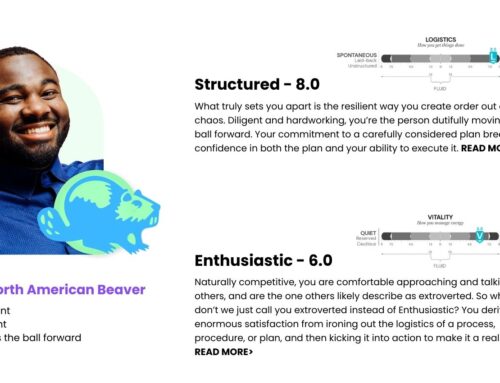Who Do You Think You Are?
If humans are good at anything, it’s imagining we know ourselves better than we do. Which is one of the reasons so many of us find ourselves in ill-suited jobs, relationships, academic majors and more.
As research into personality science expands, so too does our understanding of just how disconnected most of us are from who we really are. The greater the disconnect, the more likely we’ll find ourselves in circumstances that don’t really work for us.
“Whether it’s in trying to land a job or impress a date, people spend a staggering amount of time making claims about themselves,” writes Adam Grant, an organizational psychologist at the University of Pennsylvania’s Wharton School of Business. “But your backstage access to your own mind sometimes makes you the last person on Earth others should trust about it.”
“Your backstage access to your own mind sometimes makes you the last person on Earth others should trust about it.”
If it makes you feel any better, this epidemic of self-ignorance isn’t anyone’s fault. So much of who we are either comes bundled into our DNA, or is programmed into us long before we’ve got any say in the matter. To borrow from that old Mission Impossible theme, your mission, should you choose to accept it, is to decipher the you that you really are.
Fortunately, modern personality science can help you do just that.
Self, We Have a Problem
We cannot stress this enough: self-ignorance is baked into the process of becoming human. Meaning nobody comes of age with a very good understanding of who they are. Years of research show that:
- Fully 20-60 percent of personality is baked into our genes. Neuroscientists literally can point to the genes responsible for certain behavioral habits and traits.
- The remainder of your personality is programmed in during those early years of childhood by parents, siblings, peers, teachers, events, etc.
This means that the personality you’ve been trotting around as ‘you’ was pretty much locked in place at a time you needed a hall pass to visit the bathroom. It also means that if you were a shy, introspective child, you’re almost certainly not going to be the life of the party decades later in the nursing home.
That personality you’ve been trotting around as ‘you’ was put in place at a time you needed a hall pass to visit the bathroom.
So how do you start that process of uncovering the real you? By asking that question you’ve already started.
You Has a Problem
How and when personality is formed isn’t the problem. But our ignorance of that inherited self is. As Socrates famously declared, you don’t know what you don’t know. And if you don’t know who you really are, you’re probably going to find life an uphill battle. Or as any pilot can tell you, flying blind is never a good way to reach one’s destination.
How many of us in our 30s, 40s, or 50s still joke about not knowing what we want to be when we grow up?
Flash back to your 10-year-old self, the one who shared the same personality reading this now. At that time, did you know:
- What to study at university (or even if you wanted to attend)?
- What kind of career to pursue?
- Who the ideal mate might be?
- How to find meaning or purpose in life?
- What truly makes you happy?
Probably not, yet that child’s inner compass has been guiding you ever since.
How many of us in our 30s, 40s, or 50s still joke about not knowing what we want to be when we grow up? Turns out, there’s a lot of truth hiding in that joke.
Get to Know Yourself
Today we know how to measure personality with incredible precision. Unfortunately, most have been hoodwinked by scientifically invalid ‘personality tests’ masquerading as real science.
Perhaps the most famous of these – the Myers-Briggs Type Indicator – was conceived by a mother-daughter team with absolutely no scientific credentials. Yet millions of people erroneously believe its four-letter output says something meaningful about their personalities (hint: it doesn’t).
As for the scientifically valid, truly useful personality assessments and surveys? They’re out there, but they’re either too complicated or pricey for the average person.
This is why we launched Lucidata: to create a scientifically-valid application that enables virtually anyone to easily and quickly take an assessment to start that journey toward improved self-awareness.
All of which may raise a possible contradiction in your mind. Namely, if I don’t know myself, how could taking a self-assessment be of any value? Wouldn’t any inputs I offered be faulty as well?
Great question.
First, our specifically selected personality questions have been validated by empirical studies and designed so you can answer clearly. For example, maybe you like sleek sports cars and can easily answer that question. But you won’t likely know how that predicts your interpersonal style, how you build relationships or get work done (we do).
You don’t know what you don’t know.
Next, we use some sophisticated predictive science to aggregate and score your responses as parts of personality trait clusters which, together, help us describe your personality and how others will see you.
All of which is a fancy way of saying modern psychology has ways of deciphering personality without the person taking the assessment knowing it (it’s also why it’s very difficult to ‘trick’ these surveys).
And as if that wasn’t enough, we’ll soon be rolling out some other assessment options for allowing others to gauge your personality for you (there is a lot of research showing others know us better than ourselves).
That’s why we liken this process to a journey of self discovery. Over time, you learn more and more about yourself. We also think it’s the most important journey you’ll ever take.
Speaking of which, are you ready to start your journey? Use the link below or click here to take your free personality survey.
Who Do You Think You Are?
If humans are good at anything, it’s imagining we know ourselves better than we do. Which is one of the reasons so many of us find ourselves in ill-suited jobs, relationships, academic majors and more.
As research into personality science expands, so too does our understanding of just how disconnected most of us are from who we really are. The greater the disconnect, the more likely we’ll find ourselves in circumstances that don’t really work for us.
“Whether it’s in trying to land a job or impress a date, people spend a staggering amount of time making claims about themselves,” writes Adam Grant, an organizational psychologist at the University of Pennsylvania’s Wharton School of Business. “But your backstage access to your own mind sometimes makes you the last person on Earth others should trust about it.”
“Your backstage access to your own mind sometimes makes you the last person on Earth others should trust about it.”
If it makes you feel any better, this epidemic of self-ignorance isn’t anyone’s fault. So much of who we are either comes bundled into our DNA, or is programmed into us long before we’ve got any say in the matter. To borrow from that old Mission Impossible theme, your mission, should you choose to accept it, is to decipher the you that you really are.
Fortunately, modern personality science can help you do just that.
Self, We Have a Problem
We cannot stress this enough: self-ignorance is baked into the process of becoming human. Meaning nobody comes of age with a very good understanding of who they are. Years of research show that:
- Fully 20-60 percent of personality is baked into our genes. Neuroscientists literally can point to the genes responsible for certain behavioral habits and traits.
- The remainder of your personality is programmed in during those early years of childhood by parents, siblings, peers, teachers, events, etc.
This means that the personality you’ve been trotting around as ‘you’ was pretty much locked in place at a time you needed a hall pass to visit the bathroom. It also means that if you were a shy, introspective child, you’re almost certainly not going to be the life of the party decades later in the nursing home.
That personality you’ve been trotting around as ‘you’ was put in place at a time you needed a hall pass to visit the bathroom.
So how do you start that process of uncovering the real you? By asking that question you’ve already started.
You Has a Problem
How and when personality is formed isn’t the problem. But our ignorance of that inherited self is. As Socrates famously declared, you don’t know what you don’t know. And if you don’t know who you really are, you’re probably going to find life an uphill battle. Or as any pilot can tell you, flying blind is never a good way to reach one’s destination.
How many of us in our 30s, 40s, or 50s still joke about not knowing what we want to be when we grow up?
Flash back to your 10-year-old self, the one who shared the same personality reading this now. At that time, did you know:
- What to study at university (or even if you wanted to attend)?
- What kind of career to pursue?
- Who the ideal mate might be?
- How to find meaning or purpose in life?
- What truly makes you happy?
Probably not, yet that child’s inner compass has been guiding you ever since.
How many of us in our 30s, 40s, or 50s still joke about not knowing what we want to be when we grow up? Turns out, there’s a lot of truth hiding in that joke.
Get to Know Yourself
Today we know how to measure personality with incredible precision. Unfortunately, most have been hoodwinked by scientifically invalid ‘personality tests’ masquerading as real science.
Perhaps the most famous of these – the Myers-Briggs Type Indicator – was conceived by a mother-daughter team with absolutely no scientific credentials. Yet millions of people erroneously believe its four-letter output says something meaningful about their personalities (hint: it doesn’t).
As for the scientifically valid, truly useful personality assessments and surveys? They’re out there, but they’re either too complicated or pricey for the average person.
This is why we launched Lucidata: to create a scientifically-valid application that enables virtually anyone to easily and quickly take an assessment to start that journey toward improved self-awareness.
All of which may raise a possible contradiction in your mind. Namely, if I don’t know myself, how could taking a self-assessment be of any value? Wouldn’t any inputs I offered be faulty as well?
Great question.
First, our specifically selected personality questions have been validated by empirical studies and designed so you can answer clearly. For example, maybe you like sleek sports cars and can easily answer that question. But you won’t likely know how that predicts your interpersonal style, how you build relationships or get work done (we do).
You don’t know what you don’t know.
Next, we use some sophisticated predictive science to aggregate and score your responses as parts of personality trait clusters which, together, help us describe your personality and how others will see you.
All of which is a fancy way of saying modern psychology has ways of deciphering personality without the person taking the assessment knowing it (it’s also why it’s very difficult to ‘trick’ these surveys).
And as if that wasn’t enough, we’ll soon be rolling out some other assessment options for allowing others to gauge your personality for you (there is a lot of research showing others know us better than ourselves).
That’s why we liken this process to a journey of self discovery. Over time, you learn more and more about yourself. We also think it’s the most important journey you’ll ever take.
Speaking of which, are you ready to start your journey? Use the link below or click here to take your free personality survey.



